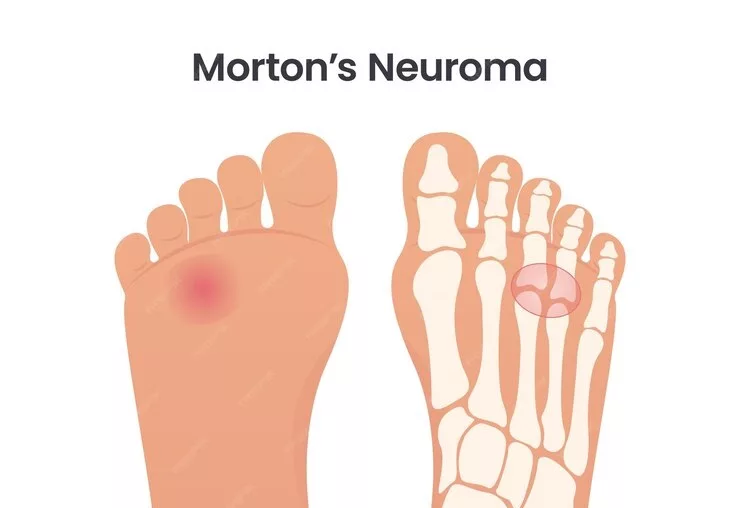What Is a Neuroma?
A neuroma represents a nerve tissue thickening that can occur in different body areas. The foot’s Morton’s neuroma is the most prevalent form, situated between the third and fourth toes and often labeled an intermetatarsal neuroma, signifying its position in the foot’s ball among the metatarsal bones. Neuromas can also arise in other foot areas.
This nerve tissue enlargement characterizing a neuroma results from nerve compression and irritation. Such compression leads to the nerve’s bulging, eliciting the signs of Morton’s neuroma, and may eventually cause irreparable nerve damage.
Causes of Morton’s Neuroma
A neuroma can stem from anything that compresses or irritates the nerve. Common culprits include shoes with narrow toe boxes or high heels that push the toes into the toe box. Foot deformities like bunions, hammertoes, flat feet, or those with more flexibility can increase neuroma risk. Other factors are repetitive stress activities to the foot’s ball, like running or court sports, and any injury or trauma to the area.
Symptoms of Morton’s Neuroma
Morton’s neuroma symptoms at the site of nerve damage may include:
- Tingling, burning, or numbness
- Pain
- The sensation of an object in the ball of the foot
- Feeling as if something is in the shoe or a sock is crumpled
Symptoms typically develop gradually and might occur occasionally when wearing tight shoes or during certain activities. They can be temporarily alleviated by removing the shoe, massaging the foot, or avoiding stress-inducing activities and shoes. Over time, symptoms gradually worsen and prolong for days or weeks, becoming intense as the neuroma expands and temporary nerve changes become permanent.
Diagnosis of Morton’s Neuroma
A foot and ankle surgeon will conduct a thorough review of your symptoms and a physical exam to diagnose. The doctor might manipulate your foot to replicate your symptoms during the exam. Additional tests or imaging may be used.
Seeing your foot and ankle surgeon early in symptom development is crucial for a less invasive treatment approach and potentially avoiding surgery.
Nonsurgical Treatment
Treatment plans designed by your foot and ankle surgeon depend on how long you’ve had the neuroma and its development stage. Options for mild to moderate neuromas include:
- Padding: Supports the metatarsal arch, diminishing nerve pressure, and walking compression.
- Icing: Reduces swelling when applied to the affected area.
- Orthotic devices: Tailored by your surgeon, these devices assist in reducing nerve pressure and compression.
- Activity modifications: Avoid repetitive pressure activities until improvement.
- Shoe modifications: Choosing shoes with broader toe boxes and avoiding narrow or high-heeled shoes.
- Medications: NSAIDs like ibuprofen to lessen pain and inflammation.
- Injection therapy: Can include cortisone, anesthetics, or other treatments.
When Is Surgery Needed?
Surgery can be considered if nonsurgical treatments do not provide sufficient relief. The surgical approach will be determined by the foot and ankle surgeon, and the recovery time will vary based on the procedure.
Post-treatment, your surgeon will advise on long-term strategies to prevent symptom recurrence, such as proper footwear and activity alterations.
Why Choose a Foot and Ankle Surgeon?
Foot and ankle surgeons are leading specialists in this field today, qualified as podiatrists, DPMs, or podiatric surgery professionals. They possess more specific education and training for the foot and ankle than other healthcare practitioners, treating a wide array of conditions, including Morton’s neuroma, in patients across age groups. Their rigorous background qualifies them to conduct various surgeries, encompassing those that might be necessary for Morton’s neuroma.





